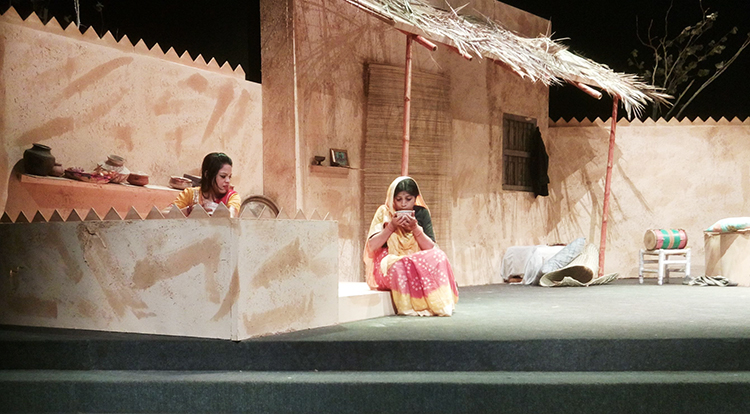Written by: Sadeem Shaikh
Posted on: November 24, 2015 | 
Champa, Lakhsmi and Sakha Ram

This past weekend, the festival commenced its second play, ‘Sakha Ram Binder’. Trusting the audience to “keep a soft heart” and facilitate such newfangled ideas, Zain Ahmed inaugurated the show with a humorous two-minute monologue. A five-person act, Sakha Ram Binder is an Indian adaptation of Vijay Tendulkar’s play, directed by a 2014 NAPA alumnus, Shahzad Jalbani. It follows a linear narrative of an Indian working class man, Sakha Ram, who believes that all will work well for him, so long as he is truthful. Giving no regard to societal and cultural values, Sakha Ram takes in other men’s discarded women as sexual servants. However, he fails to account for the broader repercussions of such a dangerous arrangement, which later put everyone involved in grave jeopardy. Set entirely in Hindi, the play features Saad Zameer as Sakha Ram Binder, and Asiya Alam (Lakhsmi) and Marya Saad (Champa) as his domestic servants and sexual partners. Khalid Sherwani and Kaleem Ghauri take on the roles of Binder’s neighbor and Champa’s husband, respectively.
The play featured quite a bit of foul language, but still managed to obtain countless rounds of laughter from an audience that comprised people from all age groups. Placing most scenes in a village setting with a simplistic outlook, the story highlighted a number of important themes that are widely relatable, especially in the Pakistani context. Sakha Ram’s obsession with male dominance and female subordination brings socially relevant bearings to the forefront. Binder gets offended when Lakhsmi and Champa passive-aggressively try to defy his power. Binder also holds his social status in the highest regard, and defies anyone who tries to challenge it. In the backdrop of this blatant class differentiation, we find a widely segregated society with Lakhsmi and Champa settling for the lowest social status.

The play also discreetly touches upon the theme of religion. Despite Binder’s strong sentiments concerning masculinity and social status, he accepts his Muslim neighbor as a close friend and confidante, and often encourages him to join in on Hindu praying rituals. Binder simultaneously justifies all of his actions with a steadfast belief in staying truthful about one’s personality and principles. Holding on to such dictated and seemingly contentious views, Binder finds his life falling apart when other people from Lakshmi and Champa’s lives become involved in their arrangement. His relationship with the two servants takes a turn for the worse, as he becomes increasingly fearful and insecure, and ends up murdering Champa in the process.
Seeking to bring out creativity and fresh perspectives amongst young theatre lovers in Karachi, the NAPA Young Directors Theatre Festival has definitely been the talk of the town in these last few days. Sakha Ram Binder is only the second one in a series of six plays scheduled to air in the coming week. The festival features four more acts, and will conclude on the 29th of November.
You may also like: